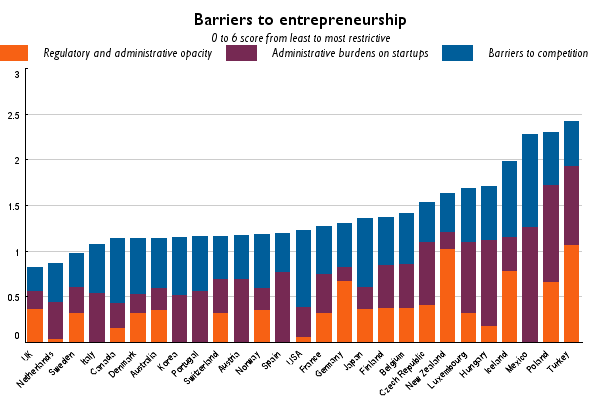起業家はリスク愛好的な、ちょっとおかしな人々がやるようなことだという認識はないだろうか。しかし、起業をするのにリスク愛好的である必要はないし、ビジネスをする上で慎重に計画を練って行動することは必要だろう。
失敗する可能性はあるが社会的に有益な事業を増やすためには、起業に伴うリスクを下げることが必要であり、その一番重要なステップは失敗を責めるのをやめることだ。
Entrepreneurs and Risk « The Baseline Scenario
I’m inclined against the conventional wisdom because I co-founded a company, it’s done pretty well, and I’m about the most risk-averse person I know. (Want proof? I even worked at McKinsey, the world’s epicenter of risk aversion; two of the other founders were also former management consultants.)
まず筆者は自らを引き合いに出して、起業家がリスク愛好的であることを否定する。これはちょっと考えれば正しいように思う。世の中にはリスクをとる方法でも幾らでもあり、自分でビジネスを始めることがその中で取り分けリスキーというわけではない。ただ単にリスクがほしいならギャンブルをすればよく、起業なんて面倒なことはしないはずだ。
[…] to start a successful company you need to have a solid plan, a realistic assessment of your chances, the willingness to take on a modest amount of financial risk […], and the belief that the non-monetary satisfaction you get along the way will more than compensate for the financial disadvantages.
では起業に必要な要素は何か。四つほど挙げられている。
- まともな計画
- 成功に対する現実的な評価
- それなりの金銭面でのリスク
- 金銭以外の満足感が費用を上回るという信念
リスクをとることがはその一つに過ぎない。そしてそれはむしろ必要悪として捉えられている。
The best encouragements to productive risk-taking are measures that limit the cost of failure for people who are actually creating something new, and this is one reason why Silicon Valley has been so successful.
では、リスクがあるが有益な行動を後押しするのに一番必要なことは何か。それは新しいことに取り組む人間にとっての失敗のコストを下げることであり、シリコンバレーがここまで成功してきたのはその文化にあるという。
The financial risks of starting a company aren’t that big, for most people. High-tech companies are typically started by people who could pull in low-six-figure salaries working for other companies, so they’re giving up a couple of hundred thousand dollars in opportunity cost; the rest is typically angel investor or venture capital money.
起業の直接的な費用は、その間ほかの会社で働くことができないという機会費用ぐらいだ。これは(少なくともアメリカでは)それほど大きくない。労働市場が流動的であれば仕事を変えることのデメリットは少ない。
More importantly, there is (historically, at least), little stigma attached to failure, so there’s little reputational downside to a failed startup.
そして、社会が失敗に対してスティグマを与えないことが重要だ。起業に失敗することに悪い評判がつかないのであれば、再び起業することも可能だ(既に一度起業した人間にとっては労働市場の硬直性に関するコストは既にサンクしており関係ない)。起業を重ねて行うことは経験を活用とするという面で有益なだけではなく、起業のリスクを軽減する。株式にちょっと手をだすのは危ないかもしれないが、たくさんの株を買えばリスクは減るのと同じだ。
In a world full of risk-averse people, that’s very important.
最後の一文は特に印象的だ。起業をリスク愛好的な人だけのものとするのではなく、リスク回避的な人間がほとんどであるということを受け入れた上で、彼らが失敗の可能性が高いが社会にとって必要な事業に取り組むことをできるだけ容易にする。こういう考えは労働市場が未だに硬直的で、移民の受け入れの目処も立たない今の日本にとって非常に重要だろう(参考:移民が必要な本当の理由)。
